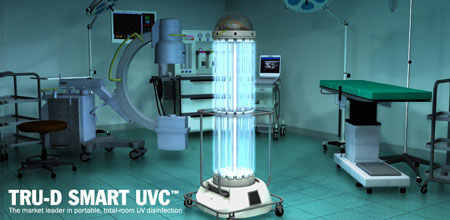| Feb 07, 2013 |
VGH first in Canada to use superbug-killing robot
|
|
(Nanowerk News) She’s just 5’5” and quiet, but don’t let her demure looks fool you—she’s a ruthless killer who moves at the speed of light. Meet Tru-D, the newest member of Vancouver General Hospital’s (VGH) Housekeeping and Infection Control teams.
|
|
Tru-D SmartUVC, or “Trudi” as staff affectionately call her, is a superbug slaying robot being piloted at VGH for the next few months.
|
 |
|
The machine disinfects surfaces with a measured dose of ultraviolet (UV) light to kill germs and viruses, such as norovirus, influenza, C. difficile, Methicillin-resistant Staphylococcus aureus (MRSA) and Vancomycin-resistant Enterococcus (VRE).
|
|
“We are always on a mission to find new and improved ways to protect our patients from superbugs,” says Dr. Elizabeth Bryce, Regional Medical Director, Infection Control/Medical Microbiologist. “So far this is shaping up to be a worse than average season for norovirus and the flu, and using UV light disinfection devices could allow us to help contain outbreaks in our facilities.”
|
|
VGH is the first hospital in Canada to use the Tru-D device. A second UV light disinfectant machine, PulseRx, will also be piloted. If either machine is found to be successful in significantly reducing the spread of infection, the hospital will analyze how to best use the technology within current budgets.
|
|
Tru-D will complement traditional, manual cleaning, taking infection control to a new level. ARAMARK Healthcare, Vancouver Coastal Health’s contracted cleaning company, will train staff to operate the machine.
|
|
“We selected Tru-D for its proven performance and ability to destroy superbugs,” said David Carpenter, President of ARAMARK Healthcare. “We are at the leading edge of innovative infection prevention practices in Canada, our training, technology, cleaning products and quality assurance processes are designed to work in close coordination with our hospital partner’s infection prevention teams.”
|
|
The total cost of the pilot is $52,000; $27,000 from an internal Innovation Fund, and $25,000 in in-kind contributions.
|

